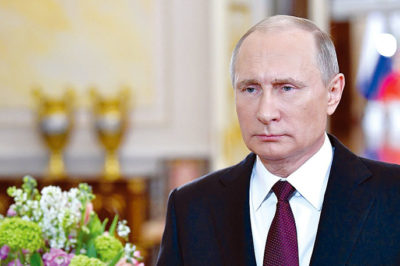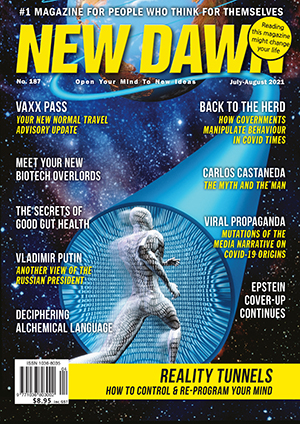From New Dawn 187 (Jul-Aug 2021)
Most people in Western countries receive a distorted and one-sided view of Russia’s long-serving president Vladimir Putin. Mainstream media reflects a clear anti-Russia bias which means we never hear the other side of the story – like in the days of the Soviet Union and Cold War. The following report by returned emigrant Yuriy Smirnov details how after near collapse Russia has been revived under Vladimir Putin. [Please note this article was published in 2021 prior to the start of Russia’s Feb. 2022 ‘Special Military Operation’ in Ukraine.]
Unlike most citizens of Russia, my “acquaintance” with Vladimir Vladimirovich Putin took place in 2008, when I returned after a seven-year absence from the country. I survived in the 90s, and well-remember the period of wild capitalism, widespread banditry, and the ever-drunk president [Boris Yeltsin] dancing to the tune of the United States.
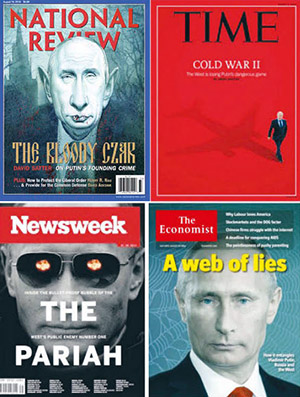
While in exile, I missed the beginning of Putin’s presidency. Life as a new immigrant to New Zealand dictated its own, more urgent goals and objectives. I simply did not care about what was happening in Russia. After a long absence, in 2008 I ended up in Moscow, observing Russia with an unbiased, fresh eye, and eagerly absorbing everything around me, looking for signs of positive change.
The first thing that caught my eye was a lot of social advertising against smoking. A poster in the Moscow subway made a strong impression on me: a very beautiful girl smiling at you, wearing a dress… from cigarette butts! – it felt so disgusting, you could almost smell the unpleasant odour of old cigarette butts in an ashtray.
A little later, I was pleasantly surprised by another fact that spoke of positive changes in the country: both Putin and Dmitry Medvedev [president from 2008 to 2012], during their presidencies, made their traditional New Year’s speech WITHOUT a glass of champagne in hand! The head of state always sets an example to his people, and that was messaging on a subconscious level: alcohol is not at all an obligatory attribute of any holiday in Russia. In the 90s, the behaviour of Boris Yeltsin in public was a clear message and approval of widespread drunkenness and alcoholism. Most people followed that example – alcohol kept flowing and the people were slowly drinking themselves to death.
Putin’s subsequent actions confirmed that his sober behaviour in public was not accidental but one of the successive steps to improve the health of the nation. As a result, in Russia today there is a complete ban on advertising of alcohol and tobacco in any form, strict requirements for liquor stores, age restrictions (for tobacco, no sales to anyone below 18 years of age; for alcohol, no sales to people under 21 years of age), a ban on smoking in public places, a ban on the sale of alcohol from 23:00 to 11:00, and tougher penalties for violations.
In subsequent years, it was very interesting for me to observe and track the positive changes initiated by Putin, or occurring with his approval and support, things that contributed to the strengthening of our country and improvement of the quality of life of the people. According to my observations, many of these facts have gone unnoticed by the general public, and that’s why I decided to list them below as opposed to the established philistine habit of blaming Putin for all the troubles occurring in Russia.
So, what good has Putin done for Russia in 20 years, apart from the steps mentioned above to improve the nation’s health?
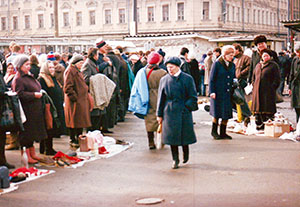
1. Saving Russia from total collapse
Putin assumed the presidency at a time when the economically dependent and externally controlled country was on the verge of collapse. Due to Putin’s thoughtful and consistent reforms, Russia survived as an independent, sovereign state.
2. Ending the war in Chechnya
The hotbed of terrorism in the south of Russia was eliminated – the significance of this fact can hardly be overestimated.
3. The Russian economy, destroyed in the 90s, was completely restored
Thanks to certain successive steps taken by Putin:
3.1: State investments in agriculture, and domestic farm and entrepreneurship support, led to the fact that today the country feeds itself, and we are no longer dependent on imports. Moreover, the ban on the cultivation of GMO products, and Russia’s vast areas and favourable environmental situation, have made the country one of the main suppliers of high-quality food products in the world.
3.2: Creation of funds that stabilise the country’s economy. Anticipating difficult times, Putin created a “safety cushion” in the form of the Stabilization Fund and the National Welfare Fund. This helped the country survive economic trials (for example, a threefold drop in oil prices). Today, social obligations to citizens are fulfilled mainly from the resources of these funds.
3.3: Gold and foreign exchange reserves were created. Gold accounts for 22% of the total value of the reserve, which was 2,295 tons of gold in 2021. For comparison, in 1993 there were only 267 tons, and in 2008, 450 tons. For several years, Russia has been the largest buyer of gold in the world.
3.4: Repayment of government debts. As most people know, an independent state policy is possible only if a country does not have significant debt obligations to other countries and financial institutions. Thus, the very fact that Russia can strongly defend its position in the international arena was made possible through Putin’s strategic genius when he promptly and significantly reduced Russia’s external debt. Today, the external public debt of Russia is one of the lowest in Europe; for many years it has been kept at $50-56 billion and is less than 5% of the country’s GDP.
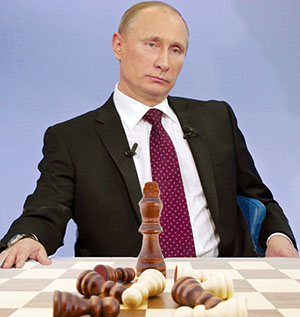
4. De-dollarisation
With Putin’s direct assistance/support, organisations such as BRICS (a union of Russia, Brazil, South Africa, China, and India) and Eurasian Economic Union (comprising Kazakhstan, Belarus, Russia, Kyrgyzstan, and Armenia) were created as an alternative to the IMF and Western economic institutions. They agreed to achieve monetary and financial sovereignty, as well as gradually eliminate dependence on the US dollar in regional trade in favour of national currencies.
5. Re-equipment of the Russian defence complex with new high-tech weapons
In his Presidential Address to the Federal Assembly in 2020, Putin announced that Russia had created new types of weapons which are unmatched in the world. It was one more step in the strengthening of defence capability, and therefore Russian independence from outside pressure.
6. Family support and solving the demographic issue
In the early nineties, the mortality rate in Russia exceeded the birth rate. With the construction of new children’s institutions, the introduction of additional child benefits and maternity capital, and a general increase in the standard of living, the demographic crisis was overcome. In 2012, population growth exceeded mortality, which speaks for itself.
Putin’s careful attitude to children and family is a special topic. From year to year, in many of his public statements, Putin speaks about the importance of strengthening families and traditional family values. He also believes that the family plays a key role in nurturing a child’s personality. And here I want to emphasise that Putin is referring precisely to the traditional family, where there is a man, a woman, and a child (children). Personally, he has nothing against gays, but when it comes to the future of Russia, he believes that it is the traditional family that is vital for the survival of the nation and essential for the development of the country. “Strengthening the family will ensure the development of Russia as a successful country,” said Putin in his message to the Federal Assembly on 15 January 2020.
7. Return of Crimea to Russia
The reunification was made possible through a referendum where 96% of the inhabitants of the peninsula voted to join Russia. And it was to Putin’s credit that he promptly responded to this referendum and made a politically wise decision to annex Crimea. At the same time, the question of annexing the Donetsk and Luhansk regions was not even considered (despite repeated requests from the leadership of the republics), which undoubtedly was another wise decision by Putin – thus he managed to avoid direct military confrontation between Russia and Ukraine.
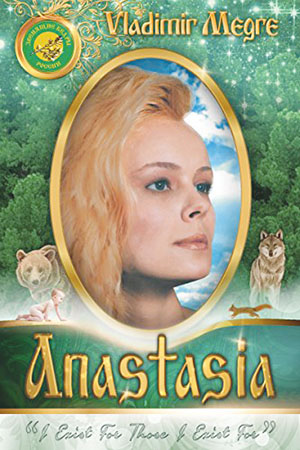
8. State support for gifted schoolchildren, students, young scientists
On the initiative of Putin, the presidential program “Gifted Children,” the national initiative “Our New School,” the Federal Target Program “Children of Russia,” and the national priority project “Education,” have all been operating in Russia. Work is also in progress under the Decree of the President of the Russian Federation, “On measures of state support for talented youth.”
In addition, under the national project “Science,” a system of support measures – financial, social, and professional – has been established for young scientists who carry out advanced research. Grants from the President of the Russian Federation are allocated in the form of two-year subsidies to finance the costs of fundamental and applied scientific research.
9. Widespread and consistent de-bureaucratisation in the country
This is another special topic worthy of attention. According to Putin, all senseless procedures and absurd norms in the social sphere that humiliate and exhaust people must be removed. In recent years, social services and government procedures have become convenient and understandable for citizens and entrepreneurs.
10. Free hectare to every Russian citizen
In 2016, with the support of Putin, the Far East Hectare Program was launched that grants the right to every citizen of Russia to receive a land plot of up to one hectare in the Far East for free (10 regions of the Far East occupy 36% of the territory of Russia). In the middle of 2020, the program “Land is Simple” was announced, which will allow registering land plots in ownership remotely, without unnecessary bureaucratic procedures. You can read more about it here ecominded.net/land-giveaway-russia.
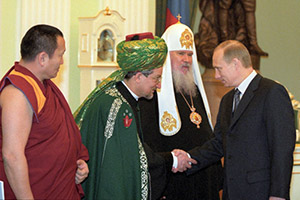
11. Amendments to the Constitution of Russia 2020
The 1993 Constitution of the Russian Federation was adopted in conditions of acute internal political crisis with the country on the verge of total collapse. Tanks fired at the parliament, and in Moscow there were clashes. The situation has now changed dramatically, and amendments to the Constitution are considered a natural result of 20 years of Putin’s activity. At the all-Russian referendum, 77.92% of Russian citizens voted for the amendments of the Constitution.
The complete list of amendments includes 206 changes in various areas from social guarantees to the judiciary and local governments. Not all of them are equal. Some, in my opinion, are more important, some less. But most of all, I like the fact that the following standards are now set out at the state level:
The priority of the Constitution of the Russian Federation over international law.
Children are the most important priority of Russian state policy.
Protection of the institution of marriage as a union of a man and a woman (that is, a traditional family!)
High officials, deputies and judges are prohibited from having foreign citizenship, residence permit in another country and foreign bank accounts.
Russia ensures the protection of historical truth and does not allow the falsification of history and the belittling of the value of the heroic deed of the people in defence of the Motherland.
Russia is taking measures to maintain and strengthen international peace and security to ensure the peaceful coexistence of states and peoples.
Russia protects the rights and interests of compatriots living abroad.
12. Russian national idea as hope of the world
“Each man will live for his fellow man! The principle has been born. It will take years for it to be crystallised, but out of Russia comes again the hope of the world” – this was the prophecy of the American clairvoyant Edgar Cayce in 1944. I do not know if Vladimir Putin is familiar with Cayce’s prophecies, but for me it is an undoubted fact that he perfectly understands the importance for Russia to have a certain unifying idea, without which the further development of the state is impossible, not to mention that it can bring hope for the rest of the world.
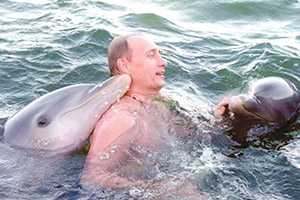
In the 19th century, the national idea of Russia was formulated by Count S.S. Uvarov (in 1833) in the form of three components: “Orthodox Christianity, Autocracy and Communality.” During the Soviet period, communism became the national idea. After the collapse of the Soviet Union, the communist idea was rejected and the so-called “de-ideologisation of society” declared. But, as they say, “a holy place is never empty,” and hostile forces – both external and internal – began to actively impose ideologies alien to Russia – the ideology of the Western way of life, individualism, consumerism, profiteering, violence, various sects, etc. Fortunately, the mentality of the people, which forms the basis of any national idea, has been formed for centuries and changes extremely slowly, thanks to which it still successfully resists the forced introduction of the values and morality of the Western world.
Every people have their own special system of thinking, the way of life that determines their view of the world, development of their community; and every person behaves in accordance with his/her national mentality and historical development. What are the main features of the Russian mentality?
First, it is an unusually great kindness. Naturally, there are kind people in every nation. There are peoples who may have a lot of flaws, but it is kindness that comes first. These are the Russians.
Secondly, it is a very humanistic view of things. The common future of mankind takes first place in the human value system, next comes the fate of the people, the fate of the family takes third place, and personal fate comes last.
Third, a highly developed sense of selflessness. A Russian is unequalled when it is necessary to “lift an unliftable” or to “bear an unbearable,” when it is necessary to “dissolve” yourself in the lives of other people or to dedicate your entire life to something you serve.
These three qualities – kindness, a humanistic worldview and selflessness – are united in the concept of spirituality as the distinguishing feature of the Russian mentality.
Then comes the next group of distinctive qualities of the Russian mentality. First, it is communality. It could also be called conciliarity; in the Soviet period it was called collectivism.
Secondly, it is traditionality, which manifests in reliance on, and preservation of, folk culture, folk traditions, folk language, folk pedagogy, folk rituals, folk crafts, etc.
Thirdly, it is openness, i.e. the curiosity of a Russian, the ability of Russian culture to be open to external influences, to absorb the values of different peoples, to spiritually enrich and transform them, while keeping its own originality and unity.
These three features can be combined into a second general concept – the national character of the Russian mentality.
Finally, there is a third group of qualities. Firstly, it is patriotism or love for the Motherland, love for your homestead and the country, the willingness to faithfully serve its prosperity, love the home, and a readiness to defend it.
Secondly, it is a recognition of the need for strong sovereign power. Obviously, Russia needs this to resist under current conditions the external and internal forces trying in every possible way to weaken Russia, to oust it from the ranks of the leading world powers, or even destroy it altogether.
Patriotism and the recognition of the need for strong state power can be united by the third general concept – great power statehood.
These three general concepts – Spirituality, National Character and Great Power Statehood – constitute the core of the national idea of Russia. For me, it is obvious that all these qualities of the Russian mentality are inherent in Vladimir Putin and are clearly expressed in his actions aimed at building strong sovereign power and supporting traditional, cultural Russian values and patriotism.
In conclusion, I would like to emphasise once again that Putin inherited an almost collapsed nation with a lot of problems. Now Russia is again a strong global power with a developed economy. Therefore, even if you don’t like something happening in the country, don’t be so quick to blame Putin. Re-read this impressive list of positive facts again, and then put yourself in the Russian president’s shoes and imagine how much work was required to solve the problems and implement all of these changes, despite pressure from external forces and the resistance of the engorged Russian parliament and financial oligarchs.
For more on Vladimir Putin, see Gary Lachman’s article ‘The Philosopher Tsar’ in New Dawn Special Issue Vol 15 No 3.
© New Dawn Magazine and the respective author.
For our reproduction notice, click here.

